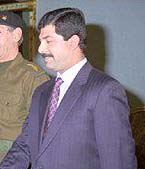 |
| Vol. 1 No. 12 | December 1999 |
According to a report in the Israeli daily Ma'ariv, "the United States is mediating the secret contacts between Israel and Iraq . . . which aim to explore the possibility of including Iraq in the 'peace circle' that is supposed to close with the achievement of an Israeli-Syrian arrangement." The report cited "senior political sources" in Jerusalem as saying that Iraq is expected to declare a termination of the state of war against Israel in return for a lifting of the economic sanctions imposed on the country in 1990. Prime Minister Ehud Barak and U.S. president Bill Clinton have explicitly discussed the issue.1
 |
| Qusay Hussein |
During the summer of 1994, Israel launched contacts with the Iraqi government, culminating in secret negotiations in Rabat between two Israeli cabinet ministers (Housing Minister Ben Eliezer and Police Minister Moshe Shahal) and Iraqi Deputy Prime Minister Tariq Aziz in July. Israeli television reported additional meetings between Israel's U.N. ambassador, Gad Ya'kovi, and the deputy head of the Iraqi U.N. delegation. According to most accounts, the Iraqi objective in pursuing the talks was to obtain Israel's assistance in persuading the U.S. to relax sanctions, while the Israelis are said to have motivated by the prospect of buying cheap oil and by the belief that an Israeli-Iraqi détente would induce a more conciliatory Syrian negotiating position. However, the Americans (whose suspicions at the time had been aroused by a prior meeting in Geneva between Shahal and the Iraqi ambassador to Switzerland) soon caught wind and forced the Israelis to sever the contacts. 3
1 Ma'ariv, 13 Dec 1999.
2 "Saddam's Son Met Israelis," UPI, 25 November 1999.
3 "Israeli Mavericks Cut Contact with Iraq After US Outcry," Agence France Presse, 19 September 1994. See also "Israel Plays the Iraqi Card," Middle East International, 23 September 1994, p.9.
� 1999 Middle East Intelligence Bulletin. All rights reserved.